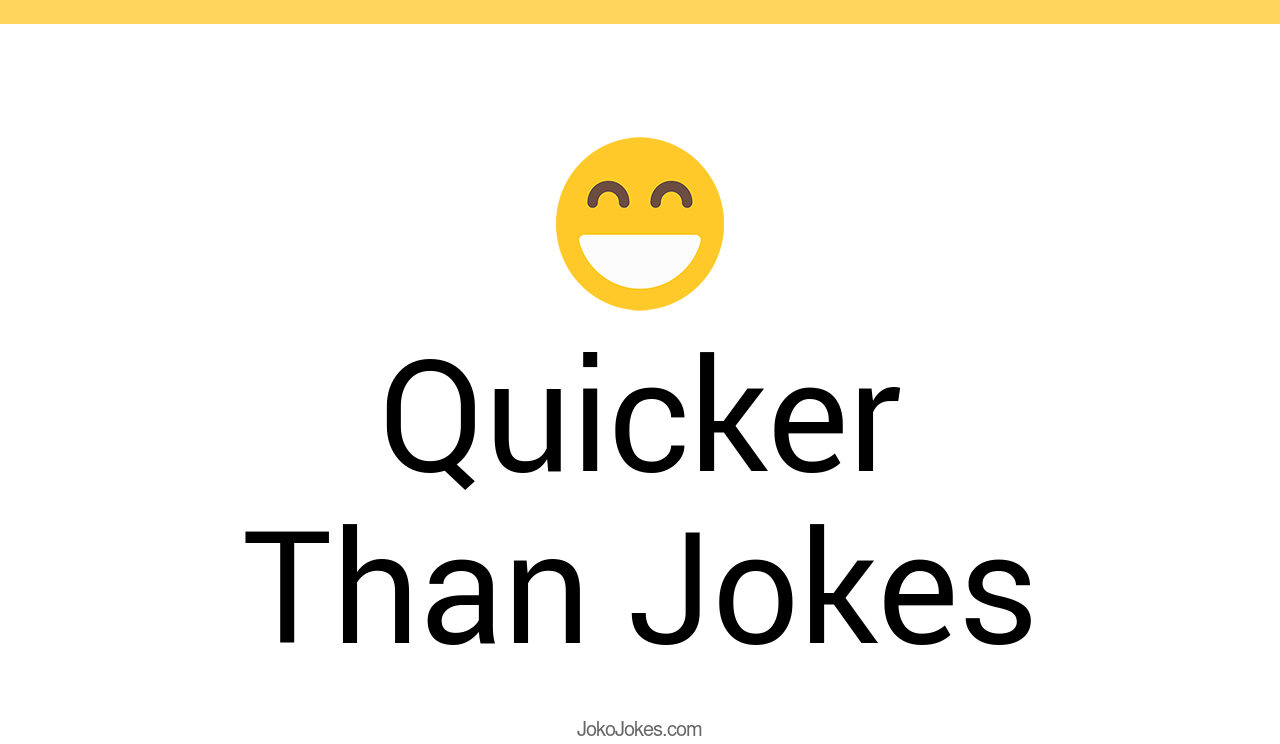In the fast-paced world we live in, humor has become a vital tool for connection, entertainment, and even communication. The phrase “quicker than jokes” encapsulates the essence of delivering humor that is not only fast but also impactful. Understanding how to craft jokes that resonate instantly can change the way we interact with others, creating moments of joy and laughter in the blink of an eye. This article explores the various elements that contribute to humor, the psychology behind it, and practical tips for delivering quick, effective jokes.
Humor is an art form that transcends cultures and languages, making it a universal language of sorts. Whether it’s through stand-up comedy, memes, or casual banter, the ability to deliver a punchline swiftly can leave a lasting impression. In this article, we will delve into the science of humor, explore different types of jokes, and provide guidance on how to develop your comedic timing.
Join us on this journey to discover what it means to be “quicker than jokes” and how mastering this skill can enhance your social interactions, improve your mood, and even contribute to your overall well-being. Let’s get started!
Table of Contents
- The Science of Humor
- Types of Jokes
- The Importance of Timing
- How to Craft a Quick Joke
- The Psychology of Laughter
- Cultural Variations in Humor
- Common Mistakes to Avoid
- Conclusion
The Science of Humor
Understanding the science behind humor can give you insights into why certain jokes land while others fall flat. Research shows that humor activates the brain's reward system, releasing dopamine, which makes us feel good. Here are some key points:
- Humor often involves incongruity—placing two unrelated concepts together.
- Timing and delivery play crucial roles in the effectiveness of a joke.
- Humor can be a coping mechanism, helping us deal with stress and anxiety.
Types of Jokes
There are numerous types of jokes, each with its unique style and impact. Here are a few popular types:
Puns
Puns are a play on words that rely on multiple meanings or similar sounds. They can be clever and quick, making them great for fast delivery.
One-liners
One-liners are concise jokes that deliver humor in a single sentence. Their brevity makes them ideal for quick interactions.
Observational Humor
This type of humor draws from everyday situations and experiences, making it relatable and often hilarious.
The Importance of Timing
Timing is everything in comedy. A well-timed joke can enhance its impact significantly. Here are some tips for mastering comedic timing:
- Pause before delivering the punchline to build anticipation.
- Be aware of your audience’s reactions and adjust accordingly.
- Practice your delivery to ensure smoothness and confidence.
How to Craft a Quick Joke
Creating a quick joke involves creativity and practice. Here are steps to help you craft effective jokes:
- Identify your target audience and their sense of humor.
- Brainstorm ideas based on everyday experiences.
- Try different formats (puns, one-liners, etc.) to find what works.
- Test your jokes on friends or family for feedback.
The Psychology of Laughter
Laughter is a natural response to humor and has numerous psychological benefits. Understanding these can motivate you to incorporate humor into daily life:
- Laughter reduces stress and promotes relaxation.
- It strengthens social bonds and fosters connection.
- Humor can enhance creativity and problem-solving skills.
Cultural Variations in Humor
Humor is subjective and can vary greatly across cultures. Here are some examples of how humor differs:
- In some cultures, sarcasm is appreciated, while in others, it may be misunderstood.
- Physical humor may be more popular in certain regions due to cultural norms.
- Understanding local humor can enhance your ability to connect with people from different backgrounds.
Common Mistakes to Avoid
When delivering jokes, it's essential to avoid common pitfalls that can sabotage your humor:
- Avoid offensive jokes that could alienate your audience.
- Be cautious with timing; rushing the delivery can ruin the punchline.
- Don't force humor; it should feel natural and spontaneous.
Conclusion
In conclusion, mastering the art of being “quicker than jokes” can greatly enhance your social interactions and overall happiness. By understanding the science of humor, practicing your timing, and being mindful of your audience, you can craft jokes that resonate and entertain. So, don’t hesitate—start experimenting with your humor today!
We encourage you to share your thoughts in the comments below, or explore more articles on humor and communication on our site. Laughter is contagious, so spread the joy!
Thank you for reading, and we hope to see you back here soon for more engaging content!
Best UK Netflix Films: A Comprehensive Guide To Must-Watch Movies
Understanding Mathew Perry's Net Worth: A Comprehensive Analysis
New Sherlock Series: A Modern Twist On The Classic Detective Stories


